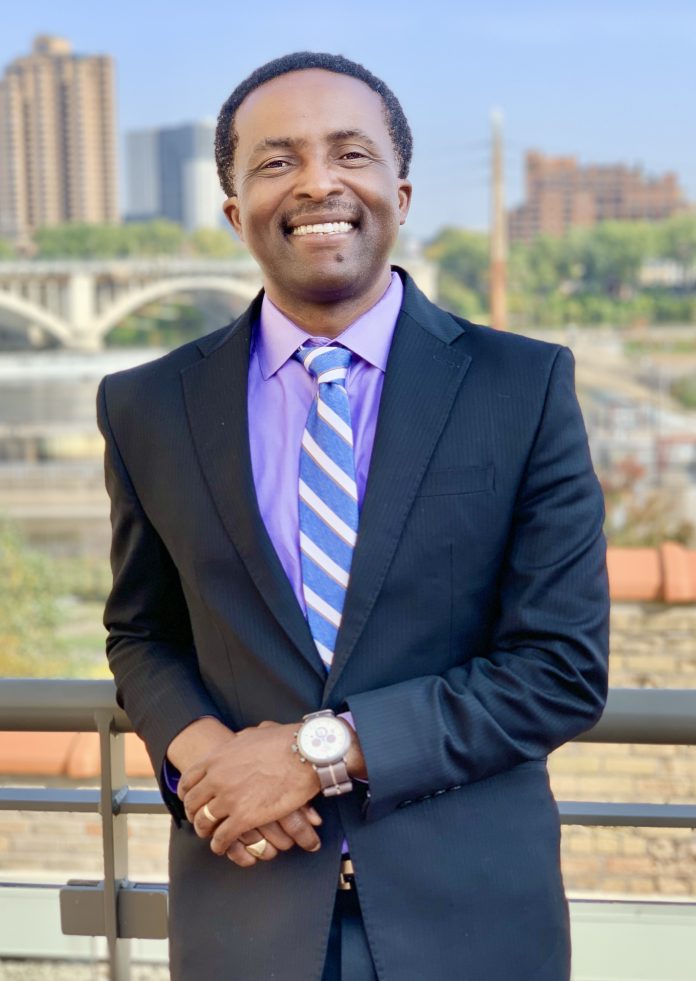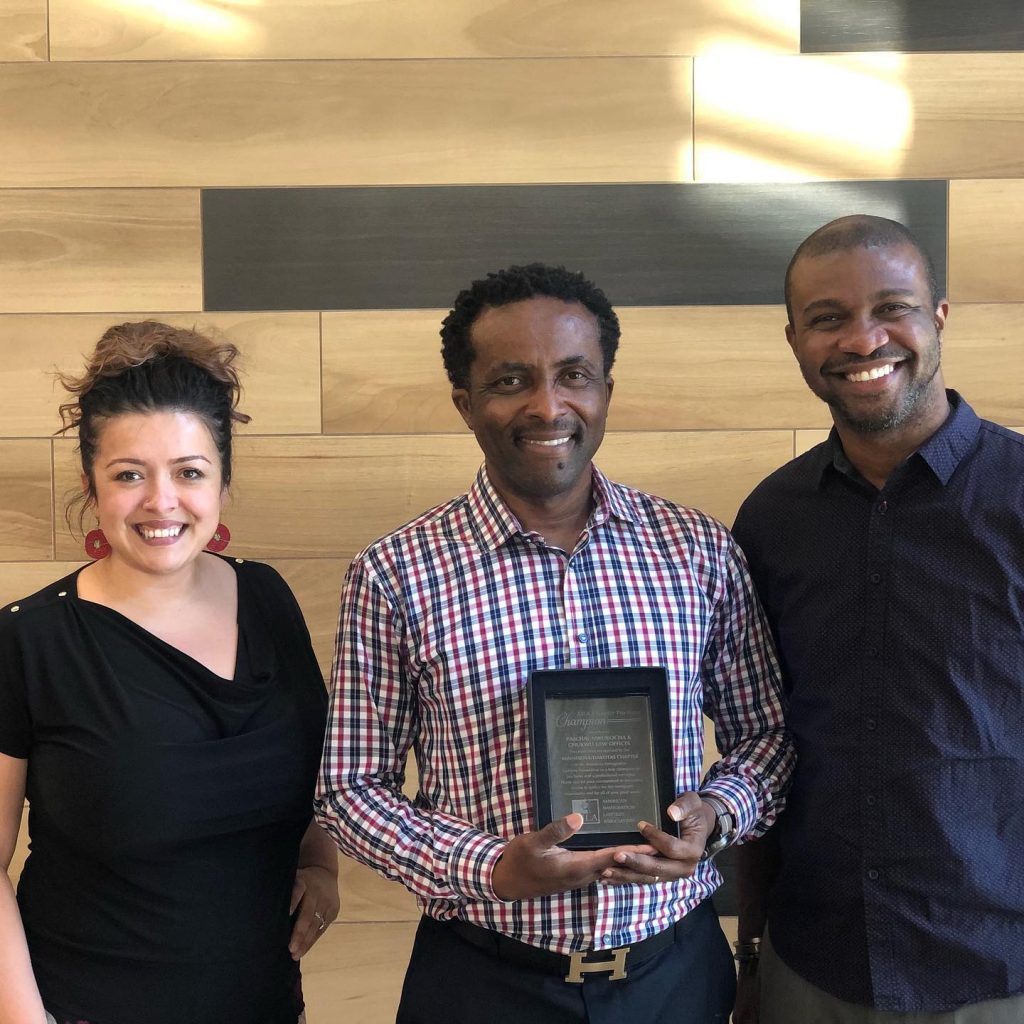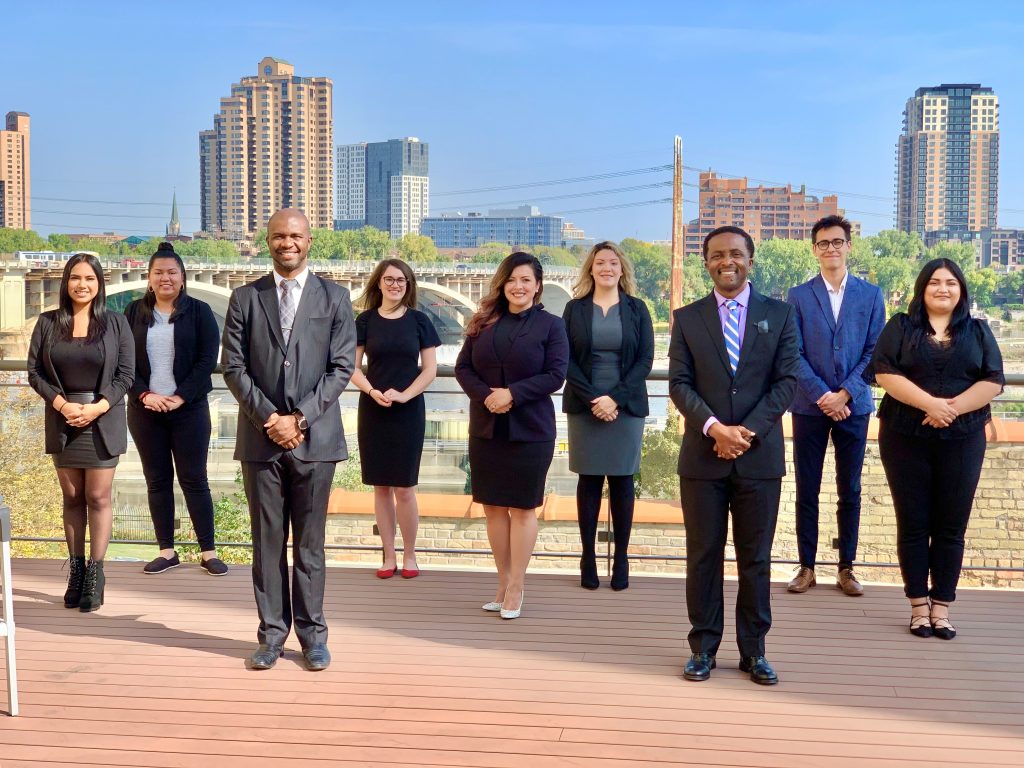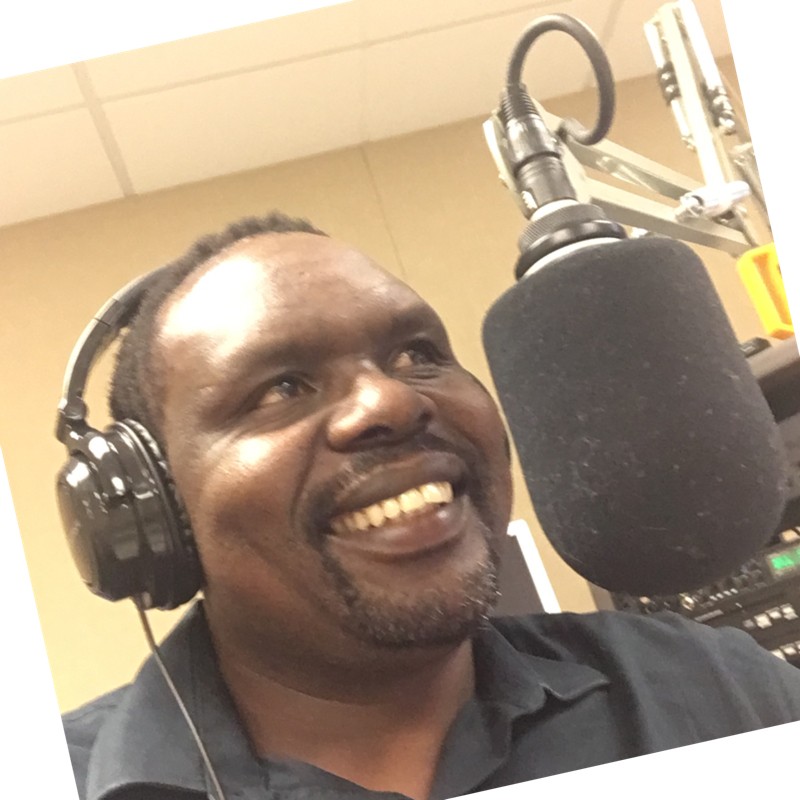

From a very early age, Paschal O. Nwokocha knew he wanted to dedicate his life to serving the most vulnerable in society. The obvious path towards that goal was through his Catholic faith. At the age of 16, he enrolled at Seat of Wisdom Seminary, in Owerri, Nigeria, his country of birth.
“I was supposed to be a Catholic priest,” Nwokocha said.
That, however, changed in 1992, when he left the seminary and came to the United States to study at the University of St. Thomas, a Catholic institution located in the Twin Cities. After graduating with a degree in Philosophy, he decided to go to law school.
Today, Nwokocha is one of the most distinguished immigration lawyers in the state of Minnesota. He is also an educator and the co-author and co-editor of the Immigration Practice Deskbook, a guidebook designed to help attorneys understand the complex field of U.S. immigration law.
But those who know Nwokocha say you wouldn’t know how accomplished he is because he has remained modest and compassionate. Although he didn’t end up being a priest, he is still a devout Catholic, who believes so strongly in serving those in need that he left a job as an environmental attorney to venture into immigration law. Through his firm, Paschal Nwokocha & Chukwu Law Offices, LLC, he has spent more than 20 years representing corporations, businesses, individuals, and families in immigration cases. Many of his clients are people who can’t afford to pay for his services. But he still provides them with the same high quality of legal representation he gives his paying clients.
“One thing that is clear to me is that without representation, the chance of any immigrant prevailing is very, very minimal,” Nwokocha said. “So, I believe that our skills and our knowledge in immigration law can be put to use, not just to those who can pay our fees, but to those who by no fault of their own cannot afford it.”
Attorneys in the United States are not required to provide free legal services, but according to the American Bar Association (ABA), “every lawyer has a professional responsibility to provide services to those unable to pay.” It recommends that each lawyer do a minimum of 50 hours of pro bono work per year.
Nwokocha goes far beyond that minimum recommendation. In May, the Supreme Court of the state of Minnesota honored him for taking more than 100 pro bono cases through Volunteer Lawyers Network (VLN), a Minneapolis-based nonprofit that links low-income clients to attorneys.
“The Minnesota State Bar Association Access to Justice Committee has brought to my attention a small number of attorneys whose commitment to pro bono has been exceptional,” Chief Justice Lorie S. Gildea wrote in a letter to Nwokocha. “You are one of those few. You are answering the highest calling of our profession by helping make equal access to justice a reality.”
Colleen R. Beebe Purisaca, who began volunteering at VLN in 1997 before becoming the managing attorney for its Immigrant Legal Services Program, said the 100 cases Nwokocha was honored for do not tell the whole story of his compassion. She has spent her entire law career in nonprofits operating in the areas of refugee, immigrant, and human rights, and has known Nwokocha for as long as he has been a lawyer. They met when he started volunteering at Park Avenue Legal Clinic, which she cofounded in 1997.
“I have always been impressed by Paschal because he is such a very kind person,” Purisaca said. “He really cares about people.”

Purisaca said the more than 100 cases of pro bono were just the ones Nwokocha himself had taken and did not include numbers of his associate attorneys, Obi E. Chukwu, and Nysha D. Operana. She said Nwokocha has created a “culture of pro bono” at his law firm, taking on some of the most complex immigration cases.
“These are not cases that are just easy cases,” Purisaca said. “They range from cases that take maybe a few weeks, to 10 years to work through the immigration system. It’s a huge commitment and they have several cases like that at their law firm.”
For its collective pro bono work, Nwokocha’s firm also received the “Pro Bono Champion” award from the Minnesota/Dakotas Chapter of the American Immigration Lawyers Association (AILA), a professional organization he and Purisaca are both members of.
“We [at AILA] really admire and respect Paschal and everyone who works at his law firm,” Purisaca said. “I think we need to give credit to the soft-spoken people who don’t always promote their own worth.”
Nwokocha’s immigrant origin is a major factor in his commitment to taking as many pro bono immigration cases as his firm can.
“Being an immigrant myself, and being surrounded by immigrants, I get to see what people go through,” Nwokocha said. “There are so many cases I get to review and say, ‘Wow! If only they had a lawyer, this would have turned out differently.’”
Ben Omorogbe, who has known Nwokocha from their law school days at the William Mitchell College of Law, said what drives Nwokocha is something more than just being an immigrant helping fellow immigrants.
“There is something visionary about him,” said Omorogbe. “He has this genuine interest and strong desire to help others.”
Omorogbe, the vice president and associate group general counsel at Travelers Insurance, said he wasn’t surprised to hear that the Minnesota Supreme Court and AILA honored Nwokocha for his exemplary service.
“He has been active in the community and has been doing phenomenal work, both as an attorney and as a member of the Twin Cities community,” Omorogbe said. “The awards reflect well on him and on the community because he puts in a lot of time and he’s very dedicated to what he does.”
Omorogbe said Nwokocha’s desire to help others went beyond offering free legal services. Outside his legal work, Nwokocha has been very involved in organizing African immigrant lawyers in the Twin Cities, Omorogbe said.
“He has been very instrumental in bringing them together in support of each other, and in the process, learning about law and life in general,” Omorogbe said.
Although Nwokocha’s firm is well known today for its immigration work, he didn’t start out as an immigration attorney. After law school, he took a job at the Minnesota Attorney General’s office, where he worked as an environmental lawyer. Adonis Neblett, who is now the general counsel at Minnesota Pollution Control Agency, was Nwokocha’s first supervisor. He said even back then he could tell that there was something exceptional about Nwokocha.
“He was warm and personable,” Neblett said. “Everybody [in the profession] is smart, everybody is capable, but not everybody can connect with people the way he does.”
Nwokocha rose through the ranks to become an Assistant Attorney General for the state of Minnesota. But in January 1999, he left to start his private practice. Neblett said that was a brave move that not even he – a much more senior attorney than Nwokocha – could have had the courage to make.
“When he exhibited the initiative and ambition to go out and establish his own practice, that says it all,” Neblett said. “He did something that I would have wished to do as a younger man, and would not dare to do as an older man.”
Neblett remembers occasionally visiting Nwokocha in those early days of his individual practice in a small office located on the first floor of a building. Neblett said he would wonder how Nwokocha got the confidence to leave a secure job and venture into the unpredictable area of private practice.

“He had to have a vision,” Neblett said. “How do you have the confidence and the faith to say that ‘I will take this path, and I fully anticipate that this will blossom, I will be able to help people, and provide more than adequately for my family?’”
Neblett said Nwokocha was even more daring because he left the area of environmental law he had worked in for so long to go into immigration law, which is not known for being lucrative.
“When you start helping people trying to maintain their status in the United States, not all of them are coming here with significant income,” Neblett said. “That was a practice that he was able to embrace.”
Neblett, who Nwokocha affectionately refers to as “my elder brother,” said he was relieved when he visited Nwokocha in a new office and found that he had recruited other lawyers as his associates.
“I knew then he was up to something good and was doing well,” Neblett said.
What continues to impress Neblett is that throughout Nwokocha’s rise to become a distinguished attorney and leader in the area of immigration law, he has retained his humility.
“In a world where we like to toot our own horns, that ready smile and warmth that he exudes is so refreshing.”
About Edwin Okong'o - Mshale Contributing Editor
Edwin Okong'o is a Mshale Contributing Editor. Formerly he was the newspaper's editor.



 (4 votes, average: 4.50 out of 5)
(4 votes, average: 4.50 out of 5)
